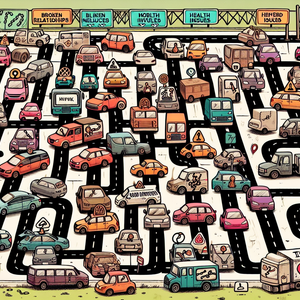The Future of DMV Careers in a Digital Age

The DMV has historically been synonymous with long lines and paperwork. However, the advent of digital platforms has revolutionized how services are delivered. Most DMVs now offer online services for vehicle registration, license renewals, and appointment scheduling. This shift not only enhances customer convenience but also reduces the workload on DMV staff, allowing them to focus on more complex tasks. For instance, states like California and Texas have introduced comprehensive online portals that enable residents to complete many DMV transactions without needing to step foot in an office. These platforms have seen a significant increase in usage, especially during the COVID-19 pandemic, when in-person visits were limited. Employees now need to be adept at managing these digital systems, which requires a different set of skills compared to traditional DMV roles.
Emerging Skill Sets for DMV Employees
As the DMV incorporates more technology into its operations, employees are required to develop new skills. Proficiency in digital tools, data management, and cybersecurity are becoming increasingly important. For instance, employees may need to understand how to use customer relationship management (CRM) systems to better serve clients or ensure the security of sensitive information. Moreover, familiarity with social media can help DMVs improve communication and outreach efforts, engaging with the public in more accessible ways. For example, states have started using platforms like Twitter and Facebook to answer common questions, provide real-time updates, and even promote new online services. This shift in communication strategy requires employees to be not just knowledgeable about their services but also adept at engaging with a digital audience.
The Impact of Automation and AI
Automation and artificial intelligence (AI) are also playing a pivotal role in transforming DMV operations. Tasks that were once performed manually, such as data entry and appointment scheduling, can now be automated, allowing employees to redirect their efforts toward enhancing customer service and compliance. For instance, chatbots can handle basic inquiries and appointment bookings, freeing up staff to assist with more complex issues. A recent study found that implementing AI-driven systems in customer service could reduce response time by up to 70%. As a result, the workforce will need to adapt to new roles that focus on oversight, strategy, and customer engagement rather than routine tasks. Employees will increasingly be looked upon to leverage technology to improve service delivery and operational efficiency.
Opportunities for Career Advancement
The digital transformation within the DMV not only changes day-to-day operations but also creates new opportunities for career advancement. Employees who embrace these changes and develop new skills will find themselves well-positioned for roles in management, technology integration, and public policy. For example, an employee who starts in a customer service role may transition into a project management position focused on implementing new digital initiatives. Organizations like the American Association of Motor Vehicle Administrators (AAMVA) are already providing training programs that help current staff transition to these new roles. This shift opens pathways for professional growth and diversification in a traditionally stable but often stagnant career environment.
Enhancing the Public's Perception of the DMV
One of the most significant benefits of this digital shift is its potential to change public perception of the DMV. By offering efficient, user-friendly services, the DMV can shed its image as a frustrating bureaucratic institution. This transformation not only improves customer satisfaction but also attracts a new generation of employees who are tech-savvy and eager to contribute to a modernized public service. A survey conducted by the National Highway Traffic Safety Administration found that citizens who interacted with digital DMV services reported a 60% higher satisfaction rate than those who visited physical locations. This newfound efficiency can lead to increased trust and respect for the DMV as a vital public service.
The future of DMV careers in a digital age is both exciting and challenging. As technology continues to reshape the landscape, it brings with it the promise of increased efficiency, enhanced customer service, and new career opportunities. Employees who are willing to adapt and grow alongside these changes will thrive in this evolving environment. By embracing digital solutions and fostering a culture of innovation, the DMV can transform itself into a modern public service agency that meets the needs of today’s citizens while paving the way for a brighter future in public service careers. The digital age is not just an obstacle for the DMV; it is an opportunity to redefine what it means to serve the public in a connected world.
Digital Customer Experience Specialist
State DMV agencies, technology consulting firms, and digital marketing agencies.
Core Responsibilities
Manage and optimize online customer service platforms, ensuring a seamless user experience.
Analyze customer feedback and data to identify areas for service improvement.
Collaborate with IT and marketing teams to enhance the digital user interface and service offerings.
Required Skills
Strong understanding of customer relationship management (CRM) systems.
Experience in user experience (UX) design or digital marketing.
Excellent communication skills for engaging with a diverse customer base.
Data Analyst for DMV Operations
State and local government agencies, data analytics firms, and consultancy companies specializing in public sector operations.
Core Responsibilities
Collect, analyze, and interpret data related to DMV services and customer interactions.
Develop reports and dashboards to support data-driven decision-making processes.
Identify trends and provide actionable insights to improve operational efficiency and service delivery.
Required Skills
Proficiency in data analysis tools (e.g., SQL, Excel, Tableau).
Strong analytical and problem-solving skills.
Knowledge of data privacy regulations and ethical data handling practices.
Cybersecurity Analyst for Public Services
Government agencies, cybersecurity firms, and technology companies focused on public sector security.
Core Responsibilities
Monitor and protect the DMV's digital infrastructure from cyber threats and vulnerabilities.
Conduct risk assessments and implement security measures to safeguard sensitive information.
Collaborate with IT teams to develop and enforce security policies and procedures.
Required Skills
Knowledge of cybersecurity frameworks (e.g., NIST, ISO 27001) and incident response strategies.
Familiarity with security tools and technologies (e.g., firewalls, intrusion detection systems).
Relevant certifications (e.g., CISSP, CEH) are highly desirable.
Project Manager for Digital Transformation
State DMV departments, consulting firms specializing in public sector modernization, and technology integrators.
Core Responsibilities
Lead initiatives focused on the implementation of new digital systems and processes within the DMV.
Coordinate cross-functional teams to ensure project milestones are met on time and within budget.
Develop training programs for staff on new technologies and operational changes.
Required Skills
Strong project management experience, preferably with certifications (e.g., PMP, Agile).
Excellent leadership and communication skills to manage diverse teams.
Knowledge of digital transformation strategies and change management practices.
Social Media Engagement Coordinator
State DMV offices, public relations agencies, and digital marketing firms focusing on government communications.
Core Responsibilities
Develop and execute social media strategies to enhance public engagement and communication.
Monitor social media channels for customer inquiries and feedback, responding in a timely manner.
Create content that informs the public about DMV services, updates, and educational resources.
Required Skills
Proficiency in social media management tools and analytics platforms.
Strong writing and content creation skills tailored to digital audiences.
Experience in public relations or communications within a governmental context.


